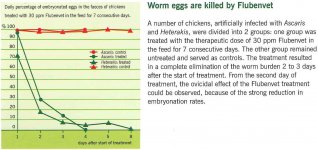Tim
Administrator
Yes, they do look like eggs. I'm surprised they are moving though. Worm eggs are killed by Flubenvet too.
Can you be sure the hen has actually had the dose of flubenvet? could she have avoided the medicated feed?
I've been looking through my literature and have found some Flubenvet info - I will try to scan and post it today.
Tim
Can you be sure the hen has actually had the dose of flubenvet? could she have avoided the medicated feed?
I've been looking through my literature and have found some Flubenvet info - I will try to scan and post it today.
Tim

